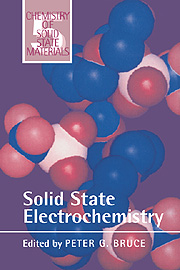Book contents
- Frontmatter
- Contents
- Preface
- 1 Introduction
- 2 Crystalline solid electrolytes I: General considerations and the major materials
- 3 Crystalline solid electrolytes II: Material design
- 4 Ionic transport in glassy electrolytes
- 5 Polymer electrolytes I: General principles
- 6 Polymer electrolytes II: Physical principles
- 7 Insertion electrodes I: Atomic and electronic structure of the hosts and their insertion compounds
- 8 Electrode performance
- 9 Polymer electrodes
- 10 Interfacial electrochemistry
- 11 Applications
- Index
1 - Introduction
Published online by Cambridge University Press: 14 September 2009
- Frontmatter
- Contents
- Preface
- 1 Introduction
- 2 Crystalline solid electrolytes I: General considerations and the major materials
- 3 Crystalline solid electrolytes II: Material design
- 4 Ionic transport in glassy electrolytes
- 5 Polymer electrolytes I: General principles
- 6 Polymer electrolytes II: Physical principles
- 7 Insertion electrodes I: Atomic and electronic structure of the hosts and their insertion compounds
- 8 Electrode performance
- 9 Polymer electrodes
- 10 Interfacial electrochemistry
- 11 Applications
- Index
Summary
I formerly described a substance, sulphuret of silver, whose conducting power was increased by heat; and I have since then met with another as strongly affected in the same way: this is fluoride of lead. When a piece of that substance, which had been fused and cooled, was introduced into the circuit of a voltaic battery, it stopped the current. Being heated, it acquired conducting powers before it was visibly red-hot in daylight; and even sparks could be taken against it whilst still solid.
M. Faraday; Philosophical Transactions of the Royal Society of London (1838)A brief history of solid state electrochemistry
Solid state electrochemistry may be divided into two broad topics.
(a) Solid electrolytes, which conduct electricity by the motion of ions, and exhibit negligible electronic transport. Included in this group are crystalline and amorphous inorganic solids as well as ionically conducting polymers.
(b) Intercalation electrodes, which conduct both ions and electrons. Again there are numerous examples based mainly on inorganic solids and polymers.
The field of solid state electrochemistry is not new. It has its origins, as does so much of electrochemistry, with Michael Faraday who discovered that PbF2 and Ag2S were good conductors. He therefore established both the first solid electrolyte and the first intercalation electrode (Faraday, 1838).
- Type
- Chapter
- Information
- Solid State Electrochemistry , pp. 1 - 6Publisher: Cambridge University PressPrint publication year: 1994
- 2
- Cited by

